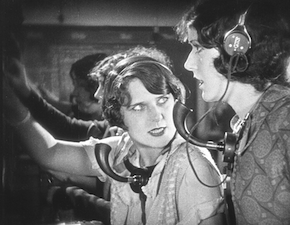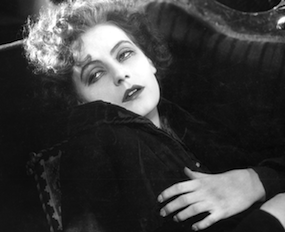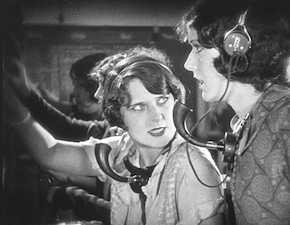
Emory Johnson's The Last Edition, with dramatic action in The San Francisco Chronicle press room, and thrilling chases through the city's streets, brings 1920s San Francisco to life. It's an exciting film anyway, but of particular interest to San Franciscans — few of whom are around with memories of these scenes in real life.
The Last Edition will screen in the Castro Theater at 3:30 p.m. July 21, part of the 2013 edition of the S.F. Silent Film Festival. Musical accompaniment is by Stephen Horne, interviewed just last week on a BBC's radio feature about Hitchcock-9.
Few of the cast members are remembered today, but when you see their outstanding work, you wonder why that is so. Ralph Lewis in the lead role, John Bailey, Billy Bakewell, Wade Boteler, Joseph Campbell, Will Frank, Ray Hallor, David Kirby, Rex Lease, and Lisa Leslie create a memorable ensemble performance.
Survival and rescue of the film should make a good movie by itself: a couple of years ago, film preservationist and SFSFF Board President Rob Byrne learned that an original nitrate print — the only known surviving copy — existed in the vaults of the Dutch national archive. The search also led to the U.S. Library of Congress, and a 35mm copy of the original theatrical trailer.
"As we are doing with the feature, the 35mm black and white trailer has been digitally scanned at 2K resolution and digital restoration techniques applied to repair damaged and deteriorated sections. From the new digital master, a new 35mm preservation negative and two 35mm prints will be created, all of which will ultimately be deposited with the Library of Congress for archival preservation," says SFSFF Artistic Director Anita Monga.

And, a bizarre punchline, to show this film about San Francisco in the city of its subject, intertitles had to be translated from Dutch.
Another memorable story is the reconstruction of The Joyless Street, another 1925 film, a classic of German silent cinema, starring Greta Garbo and Asta Nielsen. The July 20 screening in the Castro will have live musical accompaniment by the Matti Bye Ensemble
The film, which deals with interwoven stories of a number of women in Vienna at the time of the great inflation, was never lost, but all existing copies of it were in fragments, drastically altered by censors’ cuts, truncated, rearranged. The production of new German intertitles was dependent on the information contained in the original script, censorship records, and translations back into German from the intertitles of foreign versions.
When Enno Patalas completed his first reconstruction of the film at the Munich Filmmuseum in 1989, he already had all the relevant elements at his disposal. The original screenplay by Willy Haas had been acquired from G.W. Pabst’s widow for the Filmmuseum’s collection by it founder and first director Rudolph Joseph, in 1967.
Three different prints had been purchased or obtained by exchange from film archives in Moscow, London, and Paris, and the Museum of Modern Art in New York had made available an 8mm work-print of a reconstruction by Pabst’s assistant director Mark Sorkin.
Also at hand were copies of Mark Sorkin’s work-script, kept at the Museum of Modern Art in New York, and 1926 censorship report from the Berlin Chief Film Inspection bureau, contributed by the Deutsche Kinemathek in Berlin.
Without intent aforethought this column is bracketed by stories of rescue and restoration. Be they old radio programs or ancient films, the people who invest love and labor in such demanding projects should be saluted: Go to radiOM.org, then catch festival screenings in the Castro.

